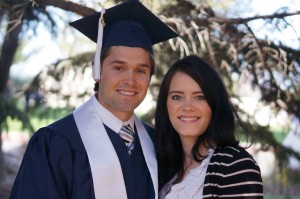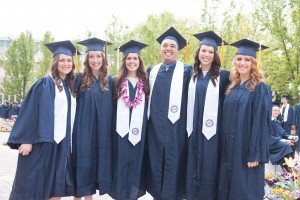College graduates across the country face the daunting task of transitioning from their education to career endeavors. At such an eventful phase of life, graduates are rarely preoccupied with religion, faith and church attendance.
A study published in the Review of Religious Research indicates that as members of various faiths receive increasingly higher education, they decrease in their religious activities or their tendencies toward religion. This conclusion was true in all but one case — that of the LDS church.

Church attendance percentage, church affiliation and religious observance increase as LDS members gain more education.
Consistent with the results of the study, within the LDS church, leaders place significant focus on the attainment of higher education.
“It is so important that you young men and you young women get all of the education that you can,” said the late Gordon B. Hinckley, former Church president. “The Lord has said very plainly that his people are to gain knowledge of countries and kingdoms and of things of the world through the process of education, even by study and by faith.”
The study shows that the propensity to be religious within the church was higher among increasingly educated demographics, compared to less-educated groups.
James Page is a registered psychologist in Salt Lake City and LDS church member. He also holds advanced degrees in engineering and law. Page explained that most people will tend to gravitate toward the reasonings and explanations for life that make most sense to them within their respective social spheres.
“The church places a significant emphasis on gaining education and contributing to society,” he said. “I think the results of this study are definitely an interesting find and are indicative of the complementary nature of the knowledge of the world to the knowledge of the gospel that I have found in my own life.”
Examples of fervent LDS religiosity can be found among highly educated, prominent leaders of the world. This includes people like Nevada Senator Harry Reid and various members of the Senate, Glenn Beck, Mitt Romney, Bill Marriott, Nolan Archibald, etc. Such people are examples of staunchly religious members of the LDS church who attend their weekly three-hour church meetings, have a church calling and provide additional service to their church wards. They also abstain from alcohol, coffee, tea, harmful drugs and tobacco and pay one-tenth of their income to the church.
While the original study was conducted in 1984, BYU religion professors Bruce Chadwick and Brent Top authored the book “Shield of Faith,” based on a study done in 2010 in which they analyzed statistical correlations between education and religiosity. Chadwick and Top ran comparisons between LDS teens and young adults to non-LDS students of the same ages for the study, and the results of the study concluded similar results.

“All of these analyses make it absolutely clear that members of the LDS Church have significantly more education than the general public. Among LDS youth, individual religiosity is associated with academic success and aspirations,” they said in the book. “The structural equation modeling demonstrates that advanced education does not lead to a decrease in religiosity among LDS adults; education does not replace religious beliefs or erode religious activities and practice.”
Anthony Sweat, a religion professor at BYU, explained that attaining advanced education opens up the doors to increased knowledge of truth, from fields of science to the truths found in the humanities. He acknowledged that the prophets of the church hold the keys to the kingdom and oversee the Lord’s work on the earth today, but he also mentioned that members of the church acknowledge that the prophets are not the sole possessors of all knowledge in all fields.
“One of the beauties of Mormonism is that we are commanded to seek knowledge by study and faith. These are not separate but intertwined entities,” Sweat said. “To put the mind (the intellect) and the heart (the affect) against one another is a false dichotomy, as we learn that the mind and the heart work together in a revelatory process of truth.”
According to LDS author Melissa Dalton-Bradford, members of the church learn the basics of scholarship through church attendance and other church-related activities. She explained that at points in her life when her faith was increasingly serious and vital, “the more extensive, rigorous and systematic [her] research in the gospel and church history became.” She said that as members of the LDS faith continue their spiritual and academic research, they will become more knowledgeable and conversant with members of different faiths about their own church history, which in turn will help to strengthen their testimonies.
“As Latter-day Saints we see all truth as part of our religion and are not (or should not) be afraid of it, no matter where it comes from,” Sweat said. “It’s fundamental to our theology that we believe all truth works harmoniously together, and my experience has been that that perspective helps formal and secular education become a part of our religious education, not adversarial to it.”




